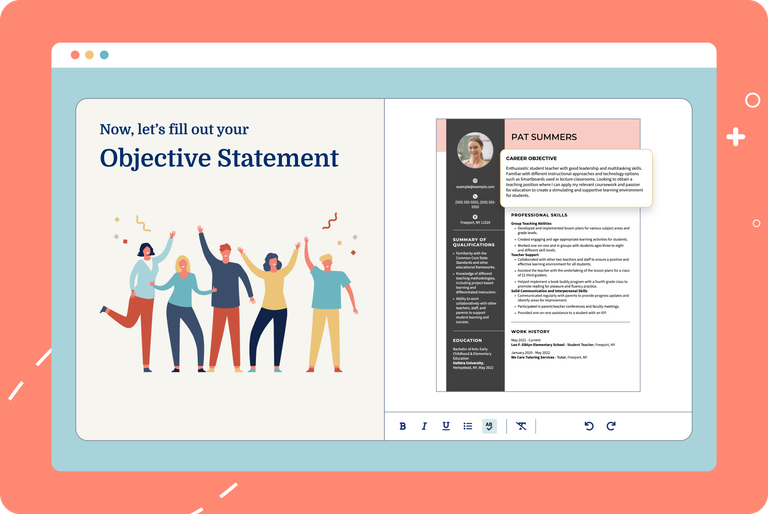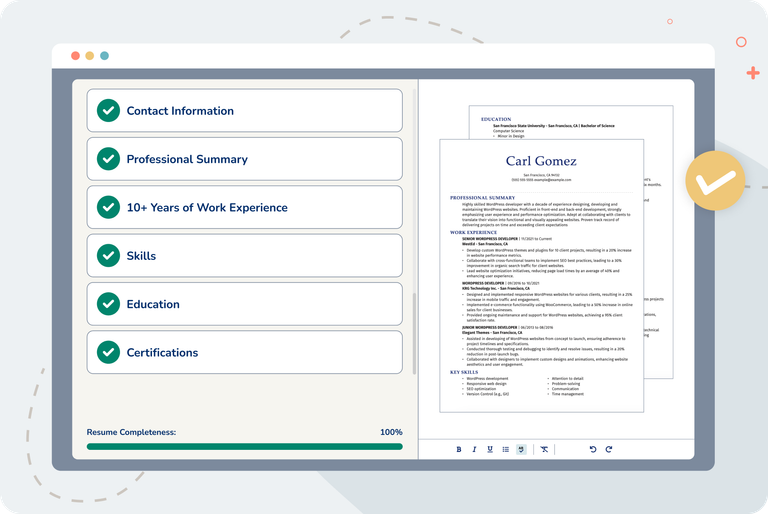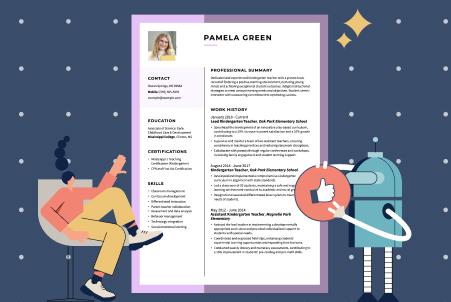Table of Contents
Get started with MyPerfectResume today!
- Build a resume on any device
- Pick an ATS-friendly template
- Tailor with AI copy suggestions
Why this resume works
- Quantifies accomplishments: By using metrics like conducting 75+ therapy sessions monthly, the applicant’s impact and value are clearly illustrated.
- Showcases career progression: The progression from mental health counselor to psychologist shows increasing responsibilities, such as designing wellness programs for over 100 clients, highlighting career growth and development.
- Uses action-oriented language: Employing action verbs such as “implemented,” “conducted,” and “developed” in their resume, the applicant conveys initiative and effectiveness.
More Psychology Resume Examples
Review our psychology resume examples to see how to showcase your counseling expertise, research experience, and interpersonal skills. Use these samples to help you create a resume that highlights your qualifications for psychology roles.
Entry-level psychology resume
Why this resume works
- Centers on academic background: By listing degrees with honors from top universities, the applicant emphasizes a strong academic foundation important for early career professionals.
- Effective use of keywords: Incorporating industry-specific terms like “Cognitive Behavioral Therapy” and “data analysis,” the applicant strategically uses keywords to navigate ATS effectively.
- Shows digital literacy: Emphasizing skills in data analysis and research design shows the applicant has the computer skills essential for performing job duties in modern workplaces.
Mid-level psychology resume
Why this resume works
- Points to measurable outcomes: By emphasizing results like a 30% boost in client satisfaction and a 25% improvement in patient outcomes, the applicant illustrates their ability to deliver impactful, data-driven contributions.
- Includes a mix of soft and hard skills: Balancing technical skills such as clinical assessments with interpersonal skills like patient advocacy shows strength in both analytical problem-solving and empathetic connection.
- Demonstrates language abilities: Fluency in Spanish, French, and German highlights language skills that strengthen cross-cultural communication and adaptability for diverse client needs.
Experienced psychology resume
Why this resume works
- Showcases impressive accomplishments: By boosting client outcomes by 30% and leading workshops for over 500 participants annually, the applicant’s accomplishments show a significant impact in mental health care.
- Focuses on work history: Employing a chronological resume format, the applicant effectively outlines extensive career progression.
- Lists relevant certifications: Listing certifications like being a Licensed Clinical Psychologist and Certified CBT Practitioner showcases the necessary credentials for the job plus an ongoing commitment to expertise and professional growth in behavioral therapy.
Psychology Resume Template (Text Version)
Olivia Martinez
Cincinnati, OH 45202
(555)555-5555
Olivia.Martinez@example.com
Professional Summary
Experienced psychologist with expertise in CBT and crisis intervention. Successfully conducted over 200 therapy sessions and implemented wellness programs improving client outcomes by 35%. Proficient in Spanish, French, and German.
Work History
Psychologist
MindCare Therapy Solutions – Cincinnati, OH
January 2023 – July 2025
- Conducted 75+ therapy sessions monthly
- Implemented CBT plans, achieving 35% improvement
- Designed wellness programs for 100+ clients
Clinical Therapist
Harmony Health Center – Columbus, OH
January 2019 – December 2022
- Led group therapy sessions with 10 participants
- Developed individualized treatment protocols
- Reduced relapse rates by 20%
Mental Health Counselor
BrightPath Caregiving – Columbus, OH
January 2017 – December 2018
- Provided crisis intervention services
- Conducted assessments for 50+ new clients
- Managed case files with 95% accuracy
Languages
- Spanish – Beginner (A1)
- French – Beginner (A1)
- German – Beginner (A1)
Skills
- Cognitive Behavioral Therapy
- Crisis Intervention
- Case Management
- Group Therapy
- Patient Assessment
- Treatment Plan Development
- Mental Health Counseling
- Psychotherapy
Certifications
- Certified Clinical Therapist – American Board of Professional Psychology
- Certified Mental Health Counselor – National Board for Certified Counselors
Education
Master of Science Clinical Psychology
University of California, Berkeley Berkeley, CA
June 2016
Bachelor of Science Psychology
University of Illinois at Urbana-Champaign Champaign, IL
June 2014
Related Resume Guides
- Aviation
- Banking
- Billing And Collections
- Biology
- Boating
- Business Operations
- Casino
- Chemistry
- Child Care
- Civil Engineering
- Compliance
- Computer Hardware
- Computer Software
- Construction
- Copywriting
- Cosmetology
- Costco
- Culinary
- Customer Service
- Dance
- Data Systems Administration
- Deloitte
- Dentistry
- Driving
- Education
- Electrical
- Electrical Engineering
- Energy
- Engineering
- Entertainment
- Entrepreneur
- Entry Level
- Environmental
- Environmental Science
- Event Planning
- Executive
- Fashion
- Film
- Finance
- Fitness And Nutrition
- Food Service
- Freelancing
- General Laborer
- Goldman Sachs
- Government
- Graphic Design
- Healthcare Support
- Hospitality
- Human Resources
- HVAC
- Industrial Engineering
- Information Technology
- Insurance
- Interior Design
- Inventory Management
- Janitorial
- Landscaping
- Language Services
- Law
- Law Enforcement
- Library
- Logistics
- Maintenance
- Marketing
- McKinsey
- Mechanical Engineering
- Mechanics
- Media And Communication
- Medical
- Mental Health
- Meta
- Metal Work
- Military
- Mining
- Museum
- Music
- Netflix
- Non Profit
- Nursing
- Pharmaceutical
- Photography
- Physical Therapy
- Plumbing
- Politics
- Production
- Program Manager
- Project Manager
- Purchasing
- Quality Control
- Real Estate
- Religion
- Retail
- Safety And Security
- Sales
- Sciences
- Shipping
- Social Services
- Special Education
- Sports
- Statistics
- Student
- Teaching
- Team Lead
- Tesla
- Training And Development
- Transportation
- Travel
- Veterinary
- Walgreens
- Walmart
- Web Development
Advice for Writing Your Psychology Resume
Learn to craft a standout resume for psychology roles by highlighting your unique skills and insights effectively. Whether you’re diving into clinical work or exploring research opportunities, we’ve got tailored tips that can help you present your expertise in the best light.
Highlight relevant certifications, training, and licenses
Certifications and specialized training in psychology are important because they show that you have learned specific skills and techniques needed for working with patients and conducting research. Licenses are even more critical as you can’t get the job without the proper credentials.
By including a dedicated section after your education or skills on your resume for your certifications, training, and licenses, you can clearly present your qualifications to potential employers. Some credentials that belong in this section include:
- Board Certified Behavior Analyst (BCBA)
- Certified Clinical Trauma Professional (CCTP)
- Certified Alcohol and Drug Counselor (CADC)
- Board Certification from the American Board of Professional Psychology (ABPP)
Having certifications can open doors to better job opportunities in psychology. They show that you’re committed to learning and improving your skills, and that you are qualified to do the work.
Example of a certifications & training section
Certified Clinical Trauma Professional (CCTP)
Issued by: International Association of Trauma Professionals (IATP)
Applied Suicide Intervention Skills Training (ASIST)
Issued by: LivingWorks
Dialectical Behavior Therapy (DBT) Intensive Training
Issued by: Behavioral Tech
Certified Cognitive Behavioral Therapist (CCBT)
Issued by: National Association of Cognitive-Behavioral Therapists (NACBT)
Looking for resume ideas? Use our professional resume examples to help shape a strong resume that stands out.
List your most relevant skills
In a psychology role, it’s important to have a mix of technical and soft skills. Technical skills might include knowledge of statistical software like SPSS or R, as well as experience with research methods and psychological testing. Soft skills are just as important; being able to communicate effectively, show empathy, and solve problems is key in working with clients and colleagues.
Including a dedicated skill section on your resume can help highlight these abilities. Mention any software tools you use, like data analysis programs or therapy apps. If you have artistic abilities that help in therapy or creating educational materials, list those too. This makes it easy for employers to see your strengths at a glance.
To make an even stronger impact, weave these skills into your work experience bullet points. For example, instead of just saying you worked with clients, mention how you used specific counseling techniques or software to track their progress. This shows not only what you did but also how you applied your skills in real situations.
Select a resume format that highlights your skills, experiences, and education in psychology to make a strong impression.
Write a strong professional summary
A professional summary on a resume is like an introduction to hiring managers, giving them a quick look at who you are. When writing your resume, you’ll need to decide whether to include a summary or an objective.
A professional summary is usually three to four sentences that highlight your experience, skills, and achievements. It’s best for people with some work history because it shows your professional identity and the value you bring. Think of it as a way to say, “Here’s what I’ve accomplished.”
On the other hand, a resume objective is more about your career goals. It’s better for entry-level applicants, those changing careers, or anyone with gaps in their work history. This section focuses on what you aim to contribute rather than past achievements.
Now that we’ve covered the basics of summaries and objectives, let’s look at examples for different experience levels to see how they can be tailored to roles like psychology.
Psychology resume summary examples
Entry-level
Recent psychology graduate with a Bachelor of Science in Psychology from an APA-accredited university. Completed internships focusing on cognitive behavior therapy and psychological assessments. Strong foundation in research methodologies and data analysis, with a passion for applying psychological principles to support mental health initiatives.
Mid-career
Psychologist with over seven years of experience in counseling and organizational psychology. Experienced in conducting individual and group therapy sessions, developing wellness programs, and facilitating workshops. Certified Cognitive Behavioral Therapist (CBT) with a track record of improving client outcomes through evidence-based interventions.
Experienced
Licensed psychologist specializing in clinical and forensic psychology with 15+ years of experience. Expert in trauma-informed care, psychological testing, and court-related evaluations. Proven leader in managing multidisciplinary teams and designing comprehensive treatment plans that improve client resilience and recovery while maintaining a compassionate therapeutic environment.
Psychology resume objective examples
Recent graduate
Energetic and empathetic recent psychology graduate seeking an entry-level role to use academic knowledge in mental health and counseling techniques. Aiming to support individuals through evidence-based practices and contribute positively to a team-oriented therapeutic environment.
Career changer
Dedicated professional transitioning into psychology with a background in education and strong interpersonal skills. Aspiring to leverage experience in student counseling and behavioral management to address mental health challenges and promote emotional well-being within diverse populations.
Recent graduate
Driven recent psychology graduate excited to begin a career in clinical settings, focusing on applying psychological theories and assessment methods. Committed to improving patient outcomes by supporting therapeutic interventions and fostering a compassionate, understanding atmosphere for all clients.
Stand out in psychology jobs by using our Resume Builder. It helps you highlight your skills, like research or counseling, with an easy-to-use format!
Showcase your accomplishments and publications
Listing your publications and presentations on a psychology resume can boost your chances of landing a job. When you include peer-reviewed articles, book chapters, and conference papers, it shows that you are actively engaged in the field.
You should list these items using a structured format following a professional style guide such as APA or MLA with citation details like the journal name, volume, issue, and year. This not only demonstrates your knowledge but also proves that others in the field have recognized your work.
Adding major awards, grants, and fellowships gives extra weight to your achievements. These accomplishments show that you’ve gained support for your research efforts from respected organizations or institutions.
If you have online research profiles like Google Scholar or ResearchGate, consider including links to them as well. These platforms can provide more detailed information about your work and make it easier for potential employers to see your influence in psychology.
By presenting all these elements clearly, you make it simple for hiring managers to understand why you’re a strong choice for the role.
Example of publications section
Peer-Reviewed Journal Articles
- Farris, K. L. (2025). The impact of mindfulness on cognitive reappraisal in high-stress environments. Journal of Consulting and Clinical Psychology, 90(3), 275-290. https://doi.org/10.1037/ccp0000000
- Farris, K. L & Davis, R. M. (2023). Social media use and its relationship to adolescent self-esteem: A longitudinal study. Developmental Psychology, 80(2), 154-170. https://doi.org/10.1037/dev0000000
Pick a resume template with clear sections and simple fonts to help employers quickly see your skills and experience without getting distracted by too many colors or graphics.
FAQ
Do I need to include a cover letter with my psychology resume?
Yes, including a cover letter with your psychology resume can be an effective way to improve your application.
A cover letter gives you the opportunity to explain why you’re passionate about psychology and how your skills align with the specific job or organization you’re applying to.
If there’s a particular area of psychology that the organization focuses on, like clinical work or research, you can highlight any relevant experience or interest in that field.
You might find it helpful to use tools like our Cover Letter Generator, which can help craft a personalized letter based on your resume details.
Additionally, looking at cover letter examples tailored to psychology roles can provide inspiration and ensure yours is impactful and relevant.
How long should a psychology’s resume be?
For a psychology professional, a one-page resume is often sufficient if you’re early in your career or have limited experience. This format highlights key skills like research abilities, clinical experience, and relevant coursework or certifications clearly.
If you have extensive experience or specialized training, moving to a two-page resume can be appropriate. Use this space wisely to detail significant contributions in research projects, therapy practices, or published works that show your expertise.
Ensure each section is directly related to the role you’re applying for. For more tips on determining the ideal length for your career stage, explore our guide on how long a resume should be.
How do you write a psychology resume with no experience?
If you don’t have direct experience in psychology, your resume should highlight your education, relevant skills, and any related activities that show your passion for the field. Here’s how you can structure a resume with no experience effectively:
- Showcase your education: Begin with your degree in psychology, including the institution name, graduation date, and any academic honors or relevant coursework.
- Highlight transferable skills: Emphasize skills such as critical thinking, communication, empathy, and data analysis that are valuable in psychology. Consider projects or papers where these skills were demonstrated.
- Include volunteer work or internships: If you’ve volunteered at mental health organizations or completed internships related to human behavior or counseling, describe these experiences with specific tasks and achievements.
- Mention extracurricular activities: Participation in psychology clubs, workshops, or conferences can demonstrate your commitment to the field. Highlight leadership roles or collaborative projects within these activities.
Tailor your resume around these strengths to demonstrate your potential to excel in an entry-level role in psychology, showing you’re ready to grow with the role.
Rate this article
Psychology
Share this page
Additional Resources

Best Psychology Schools + Resume Examples

The Illusion of Wage Growth: Where Paychecks Stretch the Farthest
U.S. wages have climbed at one of the fastest rates in modern history. Between 2020 and 2024, the average American worker’s pay rose from about $64,000 to $75,600, an 18%

100+ Resume Objective Statement Examples & Best Practices
In just a sentence or two, a resume objective statement tells hiring managers the role or career path you’re aiming for and the unique skills and value you bring to

150+ Skills for a Resume: Examples for Any Job
Crafting a standout resume starts with highlighting the skills and qualifications that demonstrate your fit for the role. But in a crowded job market, knowing which abilities will actually catch

When to Use a Two Page Resume (With Examples & Formatting Tips)
If you’ve spent years building your skills, growing in your career, and racking up accomplishments, a one-page resume might not cut it. A two-page resume gives you space to present a

How to Make an ATS Friendly Resume (Templates & Guide)
In today’s fast-paced hiring climate, many employers use applicant tracking systems (ATS) to organize, store, and screen candidate information. Optimizing your resume for ATS is essential for ensuring your application passes
